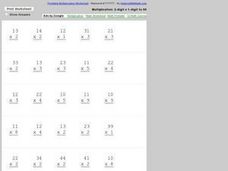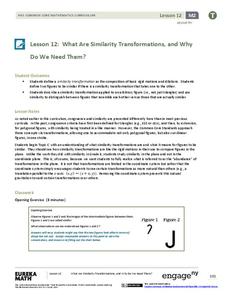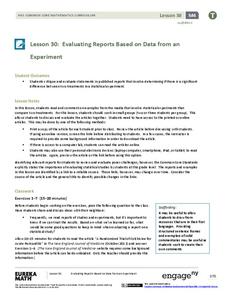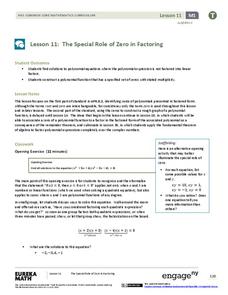Curated OER
Multiplication: 2-digit x 1-digit to 99
In this multiplication practice worksheet, 3rd graders sharpen their math skills as they solve 30 problems that require them to multiply 2-digit numbers by 1-digit numbers.
Curated OER
Division: Dividends to 81
In this division facts practice activity, students sharpen their math skills as they solve 30 problems that require them to divide 2-digit numbers by 1-digit numbers.
Helping with Math
Ratio and Proportion: Rates
Unit rates are introduced to your math minors on this printable learning exercise, complete with answers. There are only three problems: the first involves biking speeds, the second the cost of bracelets, and the third the cost of...
Mathematics Vision Project
Quadratic Equations
Through a variety of physical and theoretical situations, learners are led through the development of some of the deepest concepts in high school mathematics. Complex numbers, the fundamental theorem of algebra and rational exponents...
SurfScore
Kodable
Prepare young scholars for life in the twenty-first century with this introduction to computer coding formatted as a fun problem solving game, this resource is a great way to develop children's sequential thinking...
West Contra Costa Unified School District
Introduction to Trigonometric Functions
Scholars first learn the definitions of the sine ratio, the cosine ratio, and the tangent ratio. After mastering these definitions, they use the new information to solve triangles.
Visa
Dream Big: Money and Goals
Whether their objective is independent living, going to college, or buying a car, pupils will participate in discussions and complete worksheets to gain an understanding of how short- and long-term goals play a large role in helping...
Helping with Math
Addition: Number Bonds to 20
Pupils fill in the missing addend to an addition problem that adds up to 20. This number could be a one-digit or two-digit number. They complete a total of 41 missing addend problems. Answers are available.
EngageNY
Tangent Lines and the Tangent Function
Construct tangent lines and make the connection to tangent functions. An informative instructional activity reviews the geometry origins of the tangent function. Pupils use that information to determine how to construct a tangent to a...
EngageNY
Comparing Methods—Long Division, Again?
Remember long division from fifth grade? Use the same algorithm to divide polynomials. Learners develop a strategy for dividing polynomials using what they remember from dividing whole numbers.
Kenan Fellows
Dinner Party: Using Pattern Trains to Demonstrate Linear Functions
Nothing fancy here ... just your run-of-the-mill Algebra party! Learners explore the patterns of linear functions while designing seating arrangements for a dinner party. Comparing the number of tables to the perimeter of the combined...
EngageNY
Putting It All Together
Shuffle 'em up and deal! Learners practice operations with polynomials using cards they pass around the room. The activity works with pairs or individuals, so it offers great flexibility. This is the fifth installment in a series of 42...
Curated OER
Stochastic and Deterministic Modeling
Explore the difference between stochastic and deterministic modeling through programming. First have the class write algorithms for relatively simple tasks using pseudocode. Use the Python 2.7 program app to simulate Mendel's Pea Pod...
EngageNY
What Are Similarity Transformations, and Why Do We Need Them?
It's time for your young artists to shine! Learners examine images to determine possible similarity transformations. They then provide a sequence of transformations that map one image to the next, or give an explanation why it is...
EngageNY
Margin of Error When Estimating a Population Proportion (part 2)
Error does not mean something went wrong! Learners complete a problem from beginning to end using concepts developed throughout the last five lessons. They begin with a set of data, determine a population proportion, analyze their result...
EngageNY
Margin of Error When Estimating a Population Mean (part 2)
Don't leave your classes vulnerable in their calculations! Help them understand the importance of calculating a margin of error to represent the variability in their sample mean.
EngageNY
Evaluating Reports Based on Data from an Experiment
They say you can interpret statistics to say what you want them to. Teach your classes to recognize valid experimental results! Pupils analyze experiments and identify flaws in design or statistics.
EngageNY
Solution Sets to Simultaneous Equations (part 2)
Do you want your budding mathematicians to be able to explain 'why' and not just 'do'? This instructional activity encourages an understanding of the process of elimination. Pupils are expected to understand how and why the elimination...
EngageNY
Equivalent Rational Expressions
Rational expressions are just fancy fractions! Pupils apply fractions concepts to rational expressions. They find equivalent expressions by simplifying rational expressions using factoring. They include limits to the domain of the...
EngageNY
A Focus on Square Roots
Pupils learn to solve square root equations and rationalize denominators. Problems include those with extraneous solutions.
EngageNY
Graphing Systems of Equations
Expand on learners' understanding of quadratic-linear systems. Building on the graphic understanding developed in the previous lesson, pupils learn algebraic methods of solving the systems.
Curated OER
Addition: Number Bonds to 10
You have the answer and a variable, but something is missing! The class fills in the missing addend in 23 practice problems that all add up to 10. This is a great way to build number sense, pattern recognition, and automaticity.
EngageNY
The Special Role of Zero in Factoring
Use everything you know about quadratic equations to solve polynomial equations! Learners apply the Zero Product Property to factor and solve polynomial equations. They make a direct connection to methods they have used with quadratic...
EngageNY
Systems of Equations
What do you get when you cross a circle and a line? One, two, or maybe no solutions! Teach learners to find solutions of quadratic and linear systems. Connect the visual representation of the graph to the abstract algebraic methods.

























